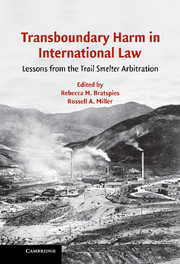Book contents
- Frontmatter
- Contents
- Contributors
- Acknowledgments
- Foreword by David D. Caron
- TRANSBOUNDARY HARM IN INTERNATIONAL LAW
- Introduction
- PART ONE THE TRAIL SMELTER ARBITRATION – HISTORY, LEGACY, AND REVIVAL
- PART TWO TRAIL SMELTER AND CONTEMPORARY TRANSBOUNDARY HARM – THE ENVIRONMENT
- PART THREE TRAIL SMELTER AND CONTEMPORARY TRANSBOUNDARY HARM – BEYOND THE ENVIRONMENT
- 18 Trail Smelter and Terrorism: International Mechanisms to Combat Transboundary Harm
- 19 The Conundrum of Corporate Social Responsibility: Reflections on the Changing Nature of Firms and States
- 20 A Pyrrhic Victory: Applying the Trail Smelter Principle to State Creation of Refugees
- 21 Transboundary Harm: Internet Torts
- 22 International Drug Pollution? Reflections on Trail Smelter and Latin American Drug Trafficking
- 23 Application of International Human Rights Conventions to Transboundary State Acts
- Annex A Convention Between the United States of America and the Dominion of Canada Relative to the Establishment of a Tribunal to Decide Questions of Indemnity and Future Regime Arising from the Operation of Smelter at Trail, British Columbia
- Annex B Trail Smelter Arbitral Tribunal Decision, April 16, 1938
- Annex C Trail Smelter Arbitral Tribunal March 11, 1941, Decision
- Index
20 - A Pyrrhic Victory: Applying the Trail Smelter Principle to State Creation of Refugees
Published online by Cambridge University Press: 08 September 2009
- Frontmatter
- Contents
- Contributors
- Acknowledgments
- Foreword by David D. Caron
- TRANSBOUNDARY HARM IN INTERNATIONAL LAW
- Introduction
- PART ONE THE TRAIL SMELTER ARBITRATION – HISTORY, LEGACY, AND REVIVAL
- PART TWO TRAIL SMELTER AND CONTEMPORARY TRANSBOUNDARY HARM – THE ENVIRONMENT
- PART THREE TRAIL SMELTER AND CONTEMPORARY TRANSBOUNDARY HARM – BEYOND THE ENVIRONMENT
- 18 Trail Smelter and Terrorism: International Mechanisms to Combat Transboundary Harm
- 19 The Conundrum of Corporate Social Responsibility: Reflections on the Changing Nature of Firms and States
- 20 A Pyrrhic Victory: Applying the Trail Smelter Principle to State Creation of Refugees
- 21 Transboundary Harm: Internet Torts
- 22 International Drug Pollution? Reflections on Trail Smelter and Latin American Drug Trafficking
- 23 Application of International Human Rights Conventions to Transboundary State Acts
- Annex A Convention Between the United States of America and the Dominion of Canada Relative to the Establishment of a Tribunal to Decide Questions of Indemnity and Future Regime Arising from the Operation of Smelter at Trail, British Columbia
- Annex B Trail Smelter Arbitral Tribunal Decision, April 16, 1938
- Annex C Trail Smelter Arbitral Tribunal March 11, 1941, Decision
- Index
Summary
INTRODUCTION
History is repelete with tales of mass expulsions. For centuries, these expulsions have been tolerated – “condemned only sporadically, while repeatedly being undertaken with international acquiescence, indifference, or approval.” It was only with the pervasive mass expulsions forced by the Nazi regime in the period leading up to, and during, World War II that international attitudes began to shift. The Nazi-era experiences prompted international consideration of the plight of refugees, and gave birth to a comprehensive and multilateral attempt to clarify international and state responsibilities toward transboundary refugees fleeing state turmoil.
Under the auspices of the United Nations, the international community codified a series of treaties setting out state responsibilities regarding the duty to care for refugees. These agreements start from the proposition that war and internal strife will occur, and will necessarily result in involuntary migrations. The agreements also assume that under conditions of scarcity, such migrations will invariably pose complex problems in the land of refuge. Nonetheless, through these treaty regimes, the international community has largely accepted that the “unduly heavy burden” of caring for refugees rests primarily on the refuge state and secondarily upon the international community as a whole.
In the latter part of the twentieth century, political upheavals again created large-scale refugee populations. Refuge states began to balk at their increasingly expensive duties towards refugees under these regimes, at least in part because meeting those duties diverted funds from more domestic concerns.
- Type
- Chapter
- Information
- Transboundary Harm in International LawLessons from the Trail Smelter Arbitration, pp. 254 - 267Publisher: Cambridge University PressPrint publication year: 2006
- 1
- Cited by

